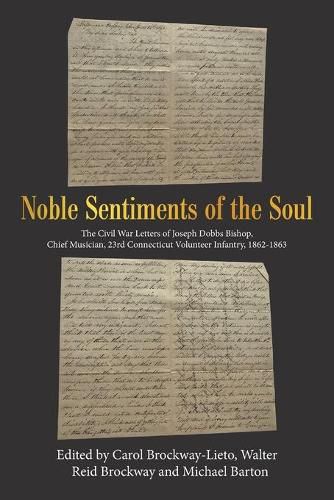Readings Newsletter
Become a Readings Member to make your shopping experience even easier.
Sign in or sign up for free!
You’re not far away from qualifying for FREE standard shipping within Australia
You’ve qualified for FREE standard shipping within Australia
The cart is loading…






This title is printed to order. This book may have been self-published. If so, we cannot guarantee the quality of the content. In the main most books will have gone through the editing process however some may not. We therefore suggest that you be aware of this before ordering this book. If in doubt check either the author or publisher’s details as we are unable to accept any returns unless they are faulty. Please contact us if you have any questions.
While Joseph Dobbs Bishop was serving in Louisiana with the 23rd Connecticut Volunteer Infantry, he wrote letters ceaselessly to his wife and children. In several ways, his correspondence is typical of Civil War soldiers-he sends news of his comrades, he mentions his duties (he was a musician as well as an infantryman), he observes the landscape, complains about weather, illness, boredom, and homesickness, and longs for more letters from his wife. But Bishop’s letters go beyond typical to remarkable. He shows conflicting feelings about the war as time passes, he expresses startling opinions about slavery and emancipation, and above all, he fills his pages with passion for his spouse. Indeed, his correspondence goes beyond romantic, such that it might even be called erotic and hence a complete surprise to the modern audience. Bishop’s letters are tragic too, so there is a complete range of emotions to appreciate here. In short, the war is not the point of these soldier’s letters; their point is the soldier’s heart.
$9.00 standard shipping within Australia
FREE standard shipping within Australia for orders over $100.00
Express & International shipping calculated at checkout
This title is printed to order. This book may have been self-published. If so, we cannot guarantee the quality of the content. In the main most books will have gone through the editing process however some may not. We therefore suggest that you be aware of this before ordering this book. If in doubt check either the author or publisher’s details as we are unable to accept any returns unless they are faulty. Please contact us if you have any questions.
While Joseph Dobbs Bishop was serving in Louisiana with the 23rd Connecticut Volunteer Infantry, he wrote letters ceaselessly to his wife and children. In several ways, his correspondence is typical of Civil War soldiers-he sends news of his comrades, he mentions his duties (he was a musician as well as an infantryman), he observes the landscape, complains about weather, illness, boredom, and homesickness, and longs for more letters from his wife. But Bishop’s letters go beyond typical to remarkable. He shows conflicting feelings about the war as time passes, he expresses startling opinions about slavery and emancipation, and above all, he fills his pages with passion for his spouse. Indeed, his correspondence goes beyond romantic, such that it might even be called erotic and hence a complete surprise to the modern audience. Bishop’s letters are tragic too, so there is a complete range of emotions to appreciate here. In short, the war is not the point of these soldier’s letters; their point is the soldier’s heart.